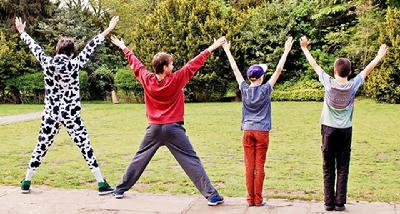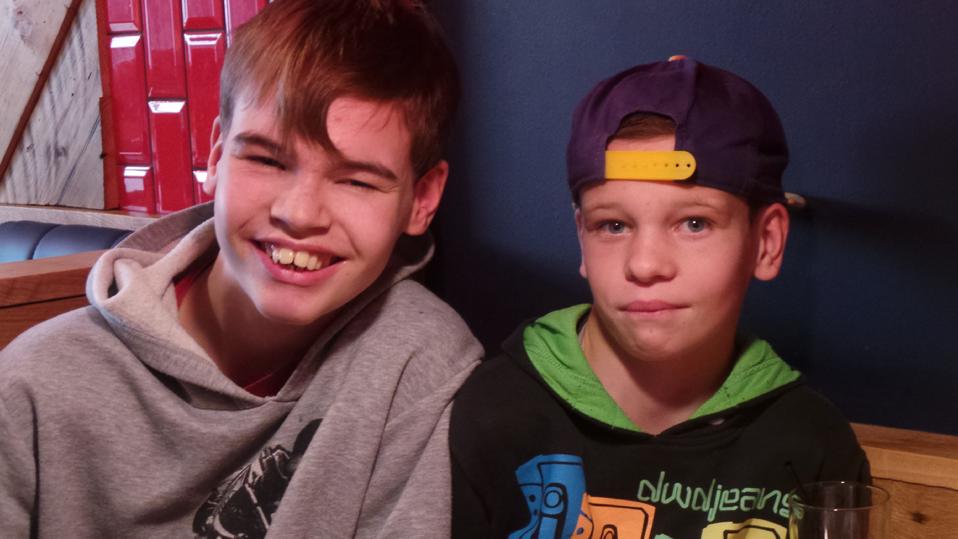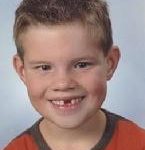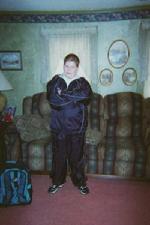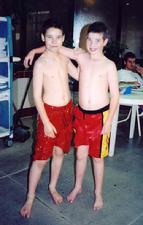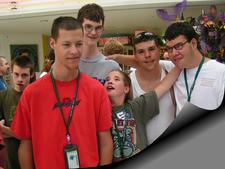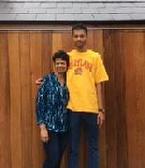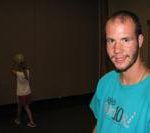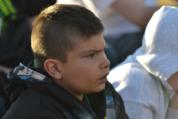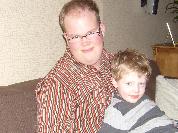| Cardiovascular risk and mortality in men receiving testosterone replacement therapy for Klinefelter syndrome in Denmark: a retrospective cohort study | Chang, Pedersen, Skakkebæk, Berglund, and Gravholt | 2025 |
| Testosterone Effects on Short-Term Physical, Hormonal, and Neurodevelopmental Outcomes (TESTO) in Infants with 47,XXY | Davis, Howell, Janusz, Lahlou, Reynolds, Thompson, Swenson, Wilson, Ross, Zeitler, and Tartaglia | 2025 |
| Generating Advancements in Longitudinal Analysis in X and Y Variations: Rationale, Methods, and Diagnostic Characteristics for the GALAXY Registry | Carl, Bothwell, Swenson, Bregante, Cohen, Cover, Dawczyk, Decker, Gerken, Hong, Howell, Raznahan, Rogol, Tartaglia, and Davis | 2025 |
| Transition to Adulthood for Individuals with X and Y Variations | Booth and Cover | 2024 |
| Evidence-based recommendations for delivering the diagnosis of X&Y chromosome multisomies in children, adolescents, and young adults: an integrative review | Riggan, Ormond, Allyse, and Close | 2024 |
| BMJ Best Practice – Klinefelter Syndrome | Rogol, Butler, and Gravholt | 2024 |
| A qualitative exploration of experiences of gender identity and gender questioning among adults with Klinefelter syndrome/XXY | Harkin and Elander | 2024 |
| Evidence‑based recommendations for delivering the diagnosis of X & Y chromosome multisomies in children, adolescents, and young adults: an integrative review | Riggan, Ormond, Allyse, and Close | 2024 |
| An extra X chromosome among adult women in the Million Veteran Program: A more benign perspective of trisomy X | Davis, Teerlink, Lynch, Klamut, Gorman, Pagadala, Panizzon, Merritt, Genovese, Ross, and Hauger | 2024 |
| A genome-first study of sex chromosome aneuploidies provides evidence of Y chromosome dosage effects on autism risk | Berry, Finucane, Myers, Walsh, Seibert, Martin, Ledbetter, and Oetjens | 2024 |
| Supernumerary sex chromosome abnormalities – new developments and future trajectories - A summary of the 2022 3rd International Workshop on Klinefelter syndrome, XYY and Trisomy X | Gravholt, Ferlin, Gromoll, Juul, Raznahan, Van Rijn, Rogol, Skakkebæk, Tartaglia, and Swaab | 2023 |
| Associations of psychiatric disorders with sex chromosome aneuploidies in the Danish iPSYCH2015 dataset: a case-cohort study | Sánchez, Montalbano, Vaez, Krebs, Byberg-Grauholm, Mortensen, Børglum, Hougaard, Nordentoft, Geschwind, Buil, Schork, Thompson, Raznahan, Helenius, Werge, and Ingason | 2023 |
| Deep phenotypic analysis of psychiatric features in genetically defined cohorts: application to XYY syndrome | Rau, Schaffer, Liu, Fish, Mankiw, Xenophontos, Clasen, Joseph, Thurm, Blumenthal, Bassett, and Torres | 2023 |
| Understanding the phenotypic spectrum and family experiences of XYY syndrome: Important considerations for genetic counseling | Jodarski, Duncan, Torres, Gore, Raznahan, and Similuk | 2023 |
| Increasing Awareness of Sex Chomosome Trisomies | Torres, Raznahan, Blumenthal, Meerschaert, and Colella | 2023 |
| Association of Supernumerary Sex Chromosome Aneuploidies With Venous Thromboembolism | Berry, Finucane, Myers, Abril, Kirchner, Ledbetter, Martin, and Oetjens | 2023 |
| Quality of life in men with Klinefelter Syndrome – a multicentre study | Franik, Fleischer, Kortmann, Stikkelbroek, D’Hauwers, Bouvattier, Slowikowska-Hilczer, Grunenwald, Van de Grift, Cartault, Richter-Unruh, Reisch, Thyen, IntHout, and Claahsen-van der Grinten | 2023 |
| The emotional journey of adapting to prenatally identified trisomy X | Thompson, Tisher, Davis, Miller, Kirk, Tartaglia, and Howell | 2023 |
| Sex chromosome aneuploidies and fertility: 47,XXY, 47,XYY, 47,XXX and 45,X/47,XXX | Rogol | 2023 |
| Executive Dysfunction in Klinefelter Syndrome: Associations With Brain Activation and Testicular Failure | Foland-Ross, Ghasemi, Lozano Wun, Aye, Kowal, Ross, and Reiss | 2023 |
| Neurocognitive and behavioral development in young children (1-7 years) with Sex Chromosome Trisomy | Van Rijn, Kuiper, Bouw, Urbanus, and Swaab | 2023 |
| Exploring Academic and Character Strengths in Students with Sex Chromosome Aneuploidies | Thompson, Davis, Takamatsu, Howell, and Tartaglia | 2022 |
| Early Preventive Intervention for Young Children With Sex Chromosome Trisomies (XXX, XXY, XYY): Supporting Social Cognitive Development Using a Neurocognitive Training Program Targeting Facial Emotion Understanding | Bouw, Swaab, and van Rijn | 2022 |
| ‘I Wish the School Had a Better Understanding of the Diagnosis’: parent perspectives on educational needs of students with SCAs | Thompson, Stinnett, Tartaglia, Davis, and Janusz | 2022 |
| Early Social Behavior in Young Children with Sex Chromosome Trisomies (XXX, XXY, XYY): Profiles of Observed Social Interactions and Social Impairments Associated with Autism Spectrum Disorder (ASD) | Bouw, Swaab, Tartaglia, Cordeiro, and van Rijn | 2022 |
| Detection and characterization of male sex chromosome abnormalities in the UK Biobank study | Zhao, Gardner, Tuke, Zhang, Pietzner, Koprulu, Jia, Ruth, Wood, Beaumont, Tyrrell, Jones, Lango Allen, Day, Langenberg, Frayling, Weedon, Perry, Ong, and Murray | 2022 |
| Supporting students with sex chromosome aneuploidies in educational settings: Results of a nationwide survey | Thompson, Davis, Janusz, Frith, Pylead, Howell, Boada, Wilson, and Tartaglia | 2022 |
| Emotional reactivity and expressivity in young children with sex chromosome trisomies: evidence from psychophysiological and observational data | Kuiper, Swaab, Tartaglia, Cordeiro, and van Rijn | 2022 |
| Klinefelter syndrome: going beyond the diagnosis | Butler, Srirangalingam, Faithfull, Sangster, Senniappan, and Mitchell | 2022 |
| Early symptoms of autism spectrum disorder (ASD) in 1–8 year old children with sex chromosome trisomies (XXX, XXY, XYY), and the predictive value of joint attention | Bouw, Swaab, Tartaglia, Wilson, van der Velde, and van Rijn | 2022 |
| Association between domains of quality of life and patients with Klinefelter syndrome: a systematic review | Mehmet, Gillard, Jayasena, and Llahana | 2022 |
| Noninvasive prenatal screening (NIPS) results for participants of the eXtraordinarY babies study: Screening, counseling, diagnosis, and discordance | Howell, Davis, Thompson, Brown, Tanda, Kowal, Alston, Ross, and Tartaglia | 2022 |
| Klinefelter Syndrome: What should we tell prospective parents? | White, Zacharin, Fawcett, and McGillivray | 2022 |
| Positive predictive value of noninvasive prenatal testing for sex chromosome abnormalities | Guo, Cai, Lin, Xue, Huang, and Xu | 2022 |
| Delaying testicular sperm extraction in 47,XXY Klinefelter patients does not impair the sperm retrieval rate, and AMH levels are higher when TESE is positive | Renault, Labrune, D’Estaing, Cuzin, Lapoirie, Benchaib, Lornage, Soignon, De Souza, Dijoud, Fraison, Pral-Chatillon, Bordes, Sanlaville, Schluth-Bolard, Salle, Ecochard, Lejeune, and Plotton | 2022 |
| Early impact of X- and Y-chromosome variations (XXX, XXY, XYY) on social communication and social emotional development in 1–2-year-old children | Bouw, Swaab, Tartaglia, Jansen, and Van Rijn | 2022 |
| Triple X syndrome: Psychiatric disorders and impaired social functioning as a risk factor | Otter, Campforts, Stumpel, Van Amelsvoort, and Drukker | 2022 |
| Population-based Assessment of Cardiometabolic-related Diagnoses in Youth With Klinefelter Syndrome: A PEDSnet Study | Davis, Nokoff, Furniss, Pyle, Valentine, Fechner, Ikomi, Magnusen, Nahata, Vogiatzi, and Dempsey | 2022 |
| Recommendations to improve the patient experience and avoid bias when prenatal screening/testing | Meredith, Brackett, Diaz, Freeman, Huggins, Khan, Leach, Levitz, Michie, Onufer, Skotko, Smith, White, Waller, and Ayers | 2022 |
| What’s missing in sex chromosome aneuploidies? Representation and inclusion | Mehmet, McDonald, Saldarriaga, Pineros-Leano, and Dwyer | 2022 |
| Variegation of autism related traits across seven neurogenetic disorders | Lee, Niu, Zhang, Clasen, Kozel, Smith, Wallace, and Raznahan | 2022 |
| Clinical, Cognitive and Neurodevelopmental Profile in Tetrasomies and Pentasomies: A Systematic Review | Ricciardi, Cammisa, Bove, Picchiotti, Spaziani, Isidori, Aceti, Giacchetti, Romani, and Sogos | 2022 |
| In Vitro Propagation of XXY Undifferentiated Mouse Spermatogonia: Model for Fertility Preservation in Klinefelter Syndrome Patients | Galdon, Deebel, Zarandi, Pettenati, Kogan, Wang, Swerdloff, Atala, Lue, and Sadri-Ardekani | 2021 |
| Recent advancement in the treatment of boys and adolescents with hypogonadism | Rey | 2021 |
| Social Management Training in Males With 47,XXY (Klinefelter Syndrome): A Pilot Study of a Neurocognitive-Behavioral Treatment Targeting Social, Emotional, and Behavioral Problems | Martin, Van Rijn, Bierman, and Swaab | 2021 |
| Social functioning and emotion recognition in adults with triple X syndrome | Otter, Crins, Campforts, Stumpel, Van Amelsvoort, and Vingerhoets | 2021 |
| Incidence of gynaecomastia in Klinefelter syndrome adolescents and outcome of testosterone treatment | Butler | 2021 |
| Cortical gray matter structure in boys with Klinefelter syndrome | Foland-Ross, Gil, Shrestha, Chromik, Hong, and Reiss | 2021 |
| The Need for Greater Awareness of Sex Chromosome Variations | Torres | 2021 |
| Onset and progression of puberty in Klinefelter syndrome | Tanner, Miettinen, Hero, Toppari, and Raivio | 2021 |
| Early developmental impact of sex chromosome trisomies on ADHD symptomology in young children | Kuiper, Swaab, Tartaglia, and van Rijn | 2021 |
| The comorbidity landscape of 47,XXX syndrome: A nationwide epidemiologic study | Berglund, Stochholm, and Gravholt | 2021 |
| Patterns of psychopathology and cognition in sex chromosome aneuploidy | Rau, Whitman, Schauder, Gogate, Lee, Kenworthy, and Raznahan | 2021 |
| Eosinophilic esophagitis in individuals with sex chromosome aneuploidies: Clinical presentations and management implications | Howell, Buchanan, Davis, Miyazawa, Furuta, Tartaglia, and Nguyen | 2021 |
| Sex Chromosome Dosage Effects on White Matter | Warling, Yavi, Clasen, Blumenthal, Lalonde, Raznahan, and Liu | 2021 |
| Sperm retrieval rates in non-mosaic Klinefelter patients undergoing testicular sperm extraction: what expectations do we have in the real-life setting? | Boeri et al | 2020 |
| Neuropsychological functions, sleep, and mental health in adults with Klinefelter syndrome | Fjermestad, Huster, Thunberg, Stokke, Gravholt, and Solbakk | 2020 |
| Morbidity in Klinefelter syndrome and the effect of testosterone treatment | Chang, Skakkebæk, Davis, and Gravholt | 2020 |
| Early neurodevelopmental and medical profile in children with sex chromosome trisomies: Background for the prospective eXtraordinarY babies study to identify early risk factors and targets for intervention | Tartaglia, Howell, Davis, Kowal, Tanda, Brown, Boada, Alston, Crawford, Thompson, Van Rijn, Wilson, Janusz, and Ross | 2020 |
| The epidemiology of sex chromosome abnormalities | Berglund, Stochholm, and Gravholt | 2020 |
| Marked Increase in Incident Gynecomastia: A 20-year National Registry Study 1998-2017 | Koch, Bräuner, Busch, Hickey, and Juul | 2020 |
| Rare sex chromosome variation 48,XXYY: An integrative review | Blumling, Martyn, Talboy, and Close | 2020 |
| European Academy of Andrology (EAA) Guidelines on Klinefelter Syndrome | Zitzmann, Aksglaede, Corona, Isidori, Juul, T’Sjoen, Kliesch, D’Hauwers, Toppari, Słowikowska-Hilczer, Tüttelmann, and Ferlin | 2020 |
| Diminished Ovarian Reserve in Girls and Adolescents with Trisomy X Syndrome | Davis, Soares, Howell, Cree-Green, Buyers, Johnson, and Tartaglia | 2020 |
| Metabolic and cardiovascular risk factors in Klinefelter syndrome | Spaziani and Radicioni | 2020 |
| Minipuberty in Klinefelter syndrome: Current status and future directions | Aksglaede, Davis, Ross, and Juul | 2020 |
| Psychological functioning, brain morphology, and functional neuroimaging in Klinefelter syndrome | Skakkebæk, Gravholt, Chang, Moore, and Wallentin | 2020 |
| Executive function in XXY: Comparison of performance-based measures and rating scales | Janusz, Harrison, C. Boada, Cordeiro, Howell, Tartaglia, and R. Boada | 2020 |
| High prevalence of cardiometabolic risk features in adolescents with 47,XXY/Klinefelter syndrome | Davis, DeKlotz, Nadeau, Kelsey, Zeitler, and Tartaglia | 2020 |
| American Journal of Medical Genetics: Special Issue on sex chromosome aneuploidies | Editors: Gravholt, Tartaglia, Disteche | 2020 |
| The Expert in the Room: Parental Advocacy for Children with Sex Chromosome Aneuploidies | Richardson, Riggan, and Allyse | 2020 |
| Klinefelter Syndrome: Identifying, characterizing and managing an underdiagnosed condition with serious consequences (CME Course) | Sadri and Howards | 2020 |
| Strategies to improve early diagnosis of Klinefelter syndrome | Ferlin | 2020 |
| Infertility considerations in Klinefelter syndrome: From origin to management | Deebel, Bradshaw, and Sadri-Ardekani | 2020 |
| The behavioral profile of children aged 1–5 years with sex chromosome trisomy (47,XXX, 47,XXY, 47,XYY) | Van Rijn, Tartaglia, Urbanus, Swaab, and Cordeiro | 2020 |
| From mini‐puberty to pre‐puberty: early impairment of the hypothalamus-pituitary-gonadal axis with normal testicular function in children with non-mosaic Klinefelter syndrome | Spaziani, Granato, Liberati, Rossi, Tahani, Pozza, Gianfrilli, Papi, Anzuini, Lenzi, Tarani, and Radicioni | 2020 |
| Epigenetics and genomics in Klinefelter syndrome | Skakkebæk, Viuff, Nielsen, and Gravholt | 2020 |
| Epigenetic and transcriptomic consequences of excess X-chromosome material in 47,XXX syndrome—A comparison with Turner syndrome and 46,XX females | Nielsen, Trolle, Vang, Hornshøj, Skakkebaek, Hedegaard, Nordentoft, Pedersen, and Gravholt | 2020 |
| What microRNAs could tell us about the human X chromosome | Di Palo, Siniscalchi, Salerno, Russo, Gravholt and Potenza | 2020 |
| Male infertility due to testicular disorders | Sharma, Minhas, Dhillo, and Jayasena | 2020 |
| A clinical algorithm for management of fertility in adolescents with Klinefelter syndrome | Masterson III, Nassaub, and Ramasamya | 2020 |
| Genetic Counseling and Family Support for Sex Chromosome Aneuploidies | Howell and Grand | 2020 |
| Seizures and Tremor in People with X & Y Chromosome Variations | Berry-Kravis | 2020 |
| Fertility Guidelines for Klinefelter Syndrome | Flannigan, Herati, Kogan, and Sadri-Ardekani | 2020 |
| Educational Guidelines, IEPs, and School Services for Children with X & Y Chromosome Variations | Frith and Thompson | 2020 |
| Quality of life in Klinefelter patients on testosterone replacement therapy compared to healthy controls: an observational study on the impact of psychological distress, personality traits, and coping strategies | Fabrazzo, Accardo, Abbondandolo, Goglia, Esposito, Sampogna, Catapano, Giugliano, and Pasquali | 2020 |
| Rare Disorder of Sexual Differentiation with a Mosaic 46,XX/47,XXY in a Klinefelter Syndrome Individual | Pattamshetty, Mantri, and Mohan | 2020 |
| Delivering the Diagnosis of Sex Chromosome Aneuploidy: Experiences and Preferences of Parents and Individuals | Jaramillo, Nyquist, Riggan, Egginton, Phelan, and Allyse | 2019 |
| A review of neurocognitive functioning and risk for psychopathology in sex chromosome trisomy (47,XXY, 47,XXX, 47,XYY) | Van Rijn | 2019 |
| Recent advances in managing and understanding Klinefelter syndrome | Bearelly and Oates | 2019 |
| Management of cardiovascular complications in Klinefelter syndrome patients | Accardo, Amoresano Paglionico, Di Fraia, Cittadini, Salzano, Esposito, De Bellis, and Pasquali | 2019 |
| Autism and social anxiety in children with sex chromosome trisomies: an observational study | Wilson, King, and Bishop | 2019 |
| Emotion regulation in adults with Klinefelter syndrome (47,XXY): Neurocognitive underpinnings and associations with mental health problems | Van Rijn and Swaab | 2019 |
| A placebo-controlled randomized study with testosterone in Klinefelter syndrome: beneficial effects on body composition | Gravholt, Høst, Bojesen, Erlandsen, Groth, Kristensen, Grethe Jurik, and Birkebæk | 2019 |
| Testosterone treatment and association with thrombin generation and coagulation inhibition in Klinefelter syndrome: A cross-sectional study | Gravholt, Chang, Biltofta, Skakkebæk, Feddere, Bojesend, Bora, and Münster | 2019 |
| Changes in the cohort composition of Turner syndrome and severe non-diagnosis of Klinefelter, 47,XXX and 47,XYY syndrome: a nationwide cohort study | Gravholt, Berglund, Hansen Viuff,Skakkebæk, Chang, and Stochholm | 2019 |
| Hypogonadotropic Hypogonadism, Delayed Puberty and Risk for Neurodevelopmental Disorders | Gotby, Söder, Frisén, Serlachius, Bölte, Almqvist, Larsson, Lichtenstein, and Tammimies | 2019 |
| Klinefelter syndrome and testosterone treatment: a national cohort study on thrombosis risk | Gravholt, Chang, Christiansen, Bojesen, Juul, and Münster | 2019 |
| Sperm recovery and ICSI outcomes in men with non-obstructive azoospermia: a systematic review and meta-analysis | Corona et al | 2019 |
| The Lived Experience of Klinefelter Syndrome: A Narrative Review of the Literature | Hanna, Cheetham, Fearon, Herbrand, Hudson, McEleny, Quinton, Stevenson, and Wilkes | 2019 |
| Fertility Considerations in Adolescent Klinefelter Syndrome: Current Practice Patterns | Bhasin and Oates | 2019 |
| Fertility in Adolescents With Klinefelter Syndrome: A Survey of Current Clinical Practice | Zganjar, Nangia, Sokol, Ryabets, and Samplaski | 2019 |
| Sex differences in psychiatric disorders: what we can learn from sex chromosome aneuploidies | Green, Flash, and Reiss | 2019 |
| Fertility management of Klinefelter syndrome | Fainberg, Hayden, and Schlegel | 2019 |
| A review of neurocognitive functioning of children with sex chromosome trisomies: Identifying targets for early intervention | Van Rijn, Urbanus, and Swaab | 2019 |
| Congenital heart defects associated with aneuploidy syndromes: New insights into familiar associations | Lin, Santoro, High, Goldenberg, and Gutmark-Little | 2019 |
| Ovarian reserve evaluation in a woman with 45,X/47,XXX mosaicism: A case report and a review of literature | Tang, Lin, Guo, Hou, and Yu | 2019 |
| Characterization of autism spectrum disorder and neurodevelopmental profiles in youth with XYY syndrome | Joseph, Farmer, Chlebowski, Henry, Fish, Makiw, Xenophontos, Clasen, Saul, Seidlitz, Blumenthal, Torres, Thurm, and Raznahan | 2018 |
| Klinefelter Syndrome. The Effects of Early Androgen Therapy on Competence and Behavioral Phenotype | Flannigan, Patel et al | 2018 |
| Testosterone in Infants with XXY | Tartaglia, Majidi, and Davis | 2018 |
| Neuroses and neuroticism: What’s the difference? | Felman | 2018 |
| Testosterone Therapy in Men With Hypogonadism: An Endocrine Society Clinical Practice Guideline | Bhasin, Brito, Cunningham, Hayes, Hodis, Matsumoto, Snyder, Swerdloff, Wu, and Yialamas | 2018 |
| Klinefelter Syndrome – Integrating Genetics, Neuropsychology and Endocrinology | Gravholt, Chang, Wallentin, Fedder, Moore, and Skakkebæk | 2018 |
| Klinefelter syndrome: more than hypogonadism | Kanakis and Nieschlag | 2018 |
| Vocal and gestural productions of 24-month-old children with sex chromosome trisomies | Zampini, Draghi, Silibello, Dall’Ara, Rigamonti, Suttora, Zanchi, Salerni, Lalatta, and Vizziello | 2018 |
| Everything You Never Knew About the ADHD Brain | Kravit | 2018 |
| DNA hypermethylation and differential gene expression associated with Klinefelter syndrome | Skakkebæk, Nielsen, Trolle, Vang, Hornshøj, Hedegaard, Wallentin, Bojesen, Hertz, Fedder, Østergaard, Pedersen, and Gravholt | 2018 |
| Anxiety and depression in Klinefelter syndrome: The impact of personality and social engagement | Skakkebæk, Moore, Pedersen, Bojesen, Kristensen, Fedder, Hertz, Østergaard, Wallentin, and Gravholt | 2018 |
| Salivary testosterone in relation to social cognition and social anxiety in children and adolescents with 47,XXY (Klinefelter syndrome) | Van Rijn | 2018 |
| Oxandrolone Treatment Results in an Increased Risk of Gonadarche in Prepubertal Boys With Klinefelter Syndrome | Davis, Lahlou, Cox-Martin, Kowal, Zeitler, and Ross | 2018 |
| Androgen treatment effects on hippocampus structure in boys with Klinefelter Syndrome | Foland-Ross, Ross, and Reiss | 2018 |
| The Association of Motor Skills & Adaptive Functioning in XXY/Klinefelter & XXYY Syndromes | Tartaglia, Davis, Martin, Cordeiro, and Richardson | 2018 |
| Counseling in Pediatric Populations at Risk for Infertility and/or Sexual Function Concerns | Nahata, Quinn, and Tishelman | 2018 |
| Research Suggests a Cure for Neuroticism | Whitbourne | 2017 |
| Quality of life in men with Klinefelter syndrome: the impact of genotype, health, socioeconomics, and sexual function | Skakkebæk, Moore, Chang, Fedder, and Gravholt | 2017 |
| Fertility achieved through in vitro fertilization in a male patient with 48,XXYY syndrome | Liu, Zhao, Hong, Mao, Yang, Zhang, and Jiang | 2017 |
| Androgen Treatment Effects on Motor Function, Cognition, and Behavior in Boys with Klinefelter Syndrome | Ross, Tartaglia, Davis, Reiss, et al | 2017 |
| Autism Spectrum Disorder in Males with Sex Chromosome Aneuploidy: XXY/Klinefelter syndrome, XYY, and XXYY | Tartaglia, Wilson, Miller, Rafalko, Cordeiro, Davis, Hessl and Ross | 2017 |
| Sperm recovery and ICSI outcomes in Klinefelter syndrome: a systematic review and meta-analysis | Corona, Pizzocaro, Lanfranco, Garolla, Pelliccione, Vignozzi, Ferlin, Foresta, Jannini, Maggi, Lenzi, Pasquali, and Francavilla | 2017 |
| Oxandrolone Yields Short-term Benefits in Treating Klinefelter’s Syndrome | Davis, Cox-Martin, Bardsley, Kowal, Zeitler, and Ross | 2016 |
| Advances in the Interdisciplinary Care of Children with Klinefelter Syndrome | Davis, Howell, Wilson, Tanda, Ross, Zeitler, and Tartaglia | 2016 |
| The Klinefelter syndrome: current management and research challenges | Nieschlag, Ferlin, Gravholt, Gromoll, Kohler, Lejeune, Rogol, and Wistuba | 2016 |
| Expanding the Phenotype of Triple X Syndrome: A Comparison of Prenatal Versus Postnatal Diagnosis | Wigby, D’Epagnier, Howell, Reicks, Wilson, Cordeiro, and Tartaglia | 2016 |
| ACMG Releases Updated Position Statement on Noninvasive Prenatal Screening (NIPS) for Detection of Fetal Aneuploidy: Addresses Questions About Expanded Role of NIPS in Prenatal Practice | ACMG | 2016 |
| The Impact of Living with Klinefelter Syndrome: A Qualitative Exploration of Adolescents and Adults | Turriff, Macnamara, Levy, and Biesecker | 2016 |
| The role of genes, intelligence, personality, and social engagement in cognitive performance in Klinefelter syndrome | Skakkebæk, Moore, Pedersen, Bojesen, Kristensen, Fedder, Laurberg, Hertz, Østergaard, Wallentin, and Gravholt | 2016 |
| The Brain-Behavior Connection In Children with ADHD | Nigg | 2016 |
| Secrets of the ADHD Brain: Why We Think, Act, and Feel the Way We Do | Dodson | 2016 |
| What are the treatments for symptoms in Klinefelter syndrome (KS)? | NIH | 2016 |
| Klinefelter syndrome (KS): genetics, clinical phenotype and hypogonadism | Bonomi, Rochira, Pasquali, Balercia, Jannini, and Ferlin | 2016 |
| Cognitive and behavioral profile of 47,XXX (Trisomy X): A research approach | Van Rijn | 2015 |
| Phenotype and Adverse Quality of Life in Boys with Klinefelter Syndrome | Close, Fennoy, Smaldone, and Reame | 2015 |
| 50 Shades of Gray: Depression Common in Borderline Testosterone | Tucker | 2015 |
| Testis Development and Reproductive Options in Males with Klinefelter Syndrome | Davis, Rogol, and Ross | 2015 |
| Executive dysfunction and the relation with behavioral problems in children with 47,XXY and 47,XXX | Van Rijn and Swaab | 2015 |
| In the Dark: Challenges of Caring for Sons with Klinefelter Syndrome | Close, Sadler, and Grey | 2015 |
| Sex Isn’t Chromosomes: The Story of a Century of Misconceptions about X & Y | Steadman | 2015 |
| Brain and behavior in 48, XXYY syndrome | Hanley, Blumenthal, Raitano Lee, Baker, Clasen, and Giedd | 2015 |
| Neural systems for social cognition: gray matter volume abnormalities in boys at high genetic risk of autism symptoms, and a comparison with idiopathic autism spectrum disorder | Van Rijn, Swaab, Goddard, and Rombouts | 2015 |
| FDA Panel Rejects New Oral Testosterone Replacement Drug | Hand | 2014 |
| Latest Testosterone Study Finds No Heart Attack Risk | Melville | 2014 |
| Putting the 'T'rouble in Testosterone Therapy? | Vega | 2014 |
| ‘Striking’ Impact of Bullying on Teens’ Mental, Physical Health | Brauser | 2014 |
| Social cognition and underlying cognitive mechanisms in children with an extra X chromosome: a comparison with autism spectrum disorder | Van Rijn, Stockmann, van Buggenhout, van Ravenswaaij-Arts, and Swaab | 2014 |
| Executive Function: What Does It Mean? Why Is It Important? How Can We Help? | Katz | 2014 |
| Brain morphology in children with 47,XYY syndrome: a voxeland surface-based morphometric study | Lepage, Hong, Raman, Marzelli, Roeltgen, Lai, Ross, and Reiss | 2014 |
| Growing Up with XYY | Unique - Rare Chromosome Disorder Support Group | 2014 |
| Cognitive and neurological aspects of sex chromosome aneuploidies | Hong and Reiss | 2014 |
| Autism spectrum disorders in XYY syndrome: two new cases and systematic review of the literature | Margari, Lamanna, Craig, Simone, and Gentile | 2014 |
| Exercising the Mind to Treat Attention Deficits | Goleman | 2014 |
| Long-term testosterone therapy does not increase the risk of prostate cancer | Elsevier Health Sciences | 2014 |
| The Sexual Politics of Autism | Hughes | 2014 |
| Social Attention, Affective Arousal and Empathy in Men with Klinefelter Syndrome (47,XXY): Evidence from Eyetracking and Skin Conductance | Van Rijn, Barendse, van Goozen, and Swaab | 2014 |
| Surgical management of male infertility: an update | Velasquez and Tanrikut | 2014 |
| Medical treatment of male infertility | Dabaja and Schlegel | 2014 |
| Genetic evaluation of male infertility | Wosnitzer | 2014 |
| Management of Klinefelter syndrome during transition | Gies, Unuane, Velkeniers, and De Schepper | 2014 |
| Feminized behavior and brain gene expression in a novel mouse model of Klinefelter Syndrome | Ngun, Ghahramani, Creek, Williams-Burris, Barseghyan, Itoh, Sánchez, McClusky, Sinsheimer, Arnold, and Vilain | 2014 |
| When to ask male adolescents to provide semen sample for fertility preservation? | Schlegel et al | 2014 |
| Seeing X Chromosomes in a New Light | Zimmer | 2014 |
| Club helps teens learn how to mix and mingle | Grace | 2014 |
| Clinical research: Extra X impairs awareness of others’ minds | Yandell | 2014 |
| Phenotypic differences in mosaic Klinefelter patients as compared with non-mosaic Klinefelter patients | Samplaski, Lo, Grober, Millar, Dimitromanolakis, and Jarvi | 2014 |
| Video Game ‘Addiction’ More Likely With Autism, ADHD | Gordon | 2013 |
| Association of Testosterone Therapy With Mortality, Myocardial Infarction, and Stroke in Men With Low Testosterone Levels | Vigen, O’Donnell, Barón, et al | 2013 |
| FDA Panel Split on Safety of Long-Acting Testosterone | Brooks | 2013 |
| First Brain-Wave Test for ADHD Approved by FDA | Lowes | 2013 |
| 47,XYY Syndrome: Clinical Phenotype and Timing of Ascertainment | Bardsley, Kowal, Levy, Gosek, Ayari, Tartaglia, Lahlou, Winder, Grimes, and Ross | 2013 |
| A qualitative exploration of mothers’ and fathers’ experiences of having a child with Klinefelter syndrome and the process of reaching this diagnosis | Bourke, Snow, Herlihy, Amor, and Metcalfe | 2013 |
| Timing of Diagnosis of 47,XXY and 48,XXYY: A Survey of Parent Experiences | Visootsak, Ayari, Howell, Lazarus, and Tartaglia | 2013 |
| Klinefelter syndrome: the commonest form of hypogonadism, but often overlooked or untreated | Nieschlag | 2013 |
| Neuroanatomical correlates of Klinefelter syndrome studied in relation to the neuropsychological profile | Skakkebæk, Gravholt, Rasmussen, Bojesen, Jensen, Fedder, Laurberg, Hertz, Ostergaard, Pedersen, and Wallentin | 2013 |
| Mosaic double aneuploidy: Down syndrome and XYY | Parihar, Koshy, and Srivastava | 2013 |
| Language Delay in Boys? Consider Klinefelter Syndrome | Jancin | 2012 |
| Living with Klinefelter Syndrome (47,XXY) Trisomy X (47, XXX) and 47, XYY: A Guide for Families and Individuals Affected by Extra X and Y Chromosome Variations | Cover | 2012 |
| Klinefelter’s syndrome—a diagnosis mislaid for 46 years | Anonymous patient, Bhartia, and Ramachandran | 2012 |
| Sex chromosomes and the brain: a study of neuroanatomy in XYY syndrome | Bryant, Hoeft, Lai, Lackey, Roeltgen, Ross, and Reiss | 2012 |
| Behavioral and Social Phenotypes in Boys With 47,XYY Syndrome or 47,XXY Klinefelter Syndrome | Ross, Roeltgen, Kushner, Zinn, Reiss, Zeger Bardsley, McCauley, and Tartaglia | 2012 |
| The social brain in psychiatric and neurological disorders | Kennedy and Adolphs | 2012 |
| Attention-Deficit Hyperactivity Disorder Symptoms in Children and Adolescents with Sex Chromosome Aneuploidy: XXY, XXX, XYY, and XXYY | Tartaglia, Ayari, Hutaff-Lee, and Boada | 2012 |
| Reduced artery diameters in Klinefelter syndrome | Foresta, Caretta, Palego, Ferlin, Zuccarello, Lenzi, and Selice | 2012 |
| Vulnerability for autism traits in boys and men with an extra X chromosome (47,XXY): the mediating role of cognitive flexibility | Van Rijn, Bierman, Bruining, and Swaab | 2012 |
| Cardiovascular abnormalities in Klinefelter syndrome | Pasquali, Arcopinto, Renzullo, Rotondi, Accardo, Salzano, Esposito, Saldamarco, Isidori, Marra, Ruvolo, Napoli, Bossone, Lenzi, Baliga, Saccà, and Cittadini | 2012 |
| Clinical review: Klinefelter syndrome - a clinical update | Groth, Skakkebæk, Høst, Gravholt, and Bojesen | 2012 |
| Executive Function...What is this anyway? | Dendy | 2011 |
| Complexities of Hypogonadism | Muthalagu | 2011 |
| EEOC Announces Final Bipartisan Regulations for the ADA Amendments Act | EEOC Press Release | 2011 |
| Guide to Trisomy X | Erskine | 2011 |
| Prevalence and diagnosis rates of Klinefelter syndrome: an Australian comparison | Herlihy, and Gillam | 2011 |
| Thinking outside the square: considering gender in Klinefelter syndrome and 47, XXY | Herlihy and Gillam | 2011 |
| Individualized Education Program (IEP): Summary, Process, and Practical Tips | Goodwin Procter and Autism Speaks | 2011 |
| The psychosocial impact of Klinefelter syndrome and factors influencing quality of life | Herlihy, McLachlan, Gillam, Cock, Collins, and Halliday | 2011 |
| IDEA – The Manual for Parents and Students About Special Education Services in Texas | The Arc and Disability Rights Texas | 2011 |
| Effects of short‐course androgen therapy on the neurodevelopmental profile of infants and children with 49,XXXXY syndrome | Samango‐Sprouse, Gropman, Sadeghin, Kingery, Lutz‐Armstrong, and Rogol | 2011 |
| New Guide Offers Road Map To IEP Process | Diament | 2011 |
| Hypogonadism in the Aging Male Diagnosis, Potential Benefits, and Risks of Testosterone Replacement Therapy | Surampudi, Wang, and Swerdloff | 2011 |
| AAP: Guideline Calls for Pre-K ADHD Evaluation | Bankhead | 2011 |
| Prevalence and Psychosocial Correlates of Depressive Symptoms Among Adolescents and Adults with Klinefelter Syndrome | Turriff, Levy, and Biesecker | 2011 |
| Neural systems for social cognition in Klinefelter syndrome (47,XXY): evidence from fMRI | Van Rijn, Swaab, Baas, de Haan, Kahn, and Aleman | 2011 |
| 48,XXYY, 48,XXXY and 49,XXXXY syndromes: not just variants of Klinefelter syndrome | Tartaglia, Ayari, Howell, D’Epagnier, and Zeitler | 2011 |
| Neuroanatomical phenotype of Klinefelter syndrome in childhood: a voxel-based morphometry study | Bryant, Hoeft, Lai, Lackey, Roeltgen, Ross, and Reiss | 2011 |
| Tantrum Tamer: New Ways Parents Can Stop Bad Behavior | Wang | 2011 |
| How many genomes do you have? | Rennie | 2011 |
| Mother labored to find reason for son’s developmental delays | Boodman | 2010 |
| Considerations for Androgen Therapy in Children and Adolescents with Klinefelter Syndrome (47, XXY) | Tartaglia and Rogol | 2010 |
| Testosterone Therapy in Men with Androgen Deficiency Syndromes: An Endocrine Society Clinical Practice Guideline | Bhasin, Cunningham, Hayes, Matsumoto, Snyder, Swerdloff, and Montori | 2010 |
| Assessing the risks and benefits of diagnosing genetic conditions with variable phenotypes through population screening: Klinefelter syndrome as an example | Herlihy, Halliday, McLachlan, Cock, and Gillam | 2010 |
| What is Intersex? | Organisation Intersex International Australia Limited | 2010 |
| Postnatal screening for Klinefelter syndrome: is there a rationale? | Herlihy, Gillam, Halliday, and McLachlan | 2010 |
| Representations of Klinefelter Syndrome | Noble | 2010 |
| Sex Chromosome Aneuploidies (from The Handbook of Pediatric Neuropsychology) | Wilson, Bennett, Howell, and Tartaglia | 2010 |
| A Review of Trisomy X (47, XXX) | Tartaglia, Howell, Sutherland, Wilson, and Wilson | 2010 |
| Anatomic magnetic resonance imaging of the developing child and adolescent brain and effects of genetic variation | Giedd, Stockman, Weddle, Liverpool, Alexander-Bloch, Wallace, Lee, Lalonde, and Lenroot | 2010 |
| Considerations for Androgen Therapy in Children and Adolescents with Klinefelter Syndrome (47, XXY) | Rogol and Tartaglia | 2010 |
| Role of the X Chromosome in Social Behavioural Dysfunction and Autism-like Behaviour | Van Rijn, Swaab, Bierman, and Zijlstra | 2010 |
| Social Function in Multiple X and Y Chromosome Disorders: XXY, XYY, XXYY, XXXY | Visootsak and Graham | 2009 |
| The psychological and social impact of Klinefelter’s Syndrome | Morris, Jackson, and Hancock | 2009 |
| Tremor in 48,XXYY Syndrome | Tartaglia, Borodyanskya, and Hall | 2009 |
| An Extra X or Y Chromosome: Contrasting the Cognitive and Motor Phenotypes in Childhood in Boys with 47,XYY Syndrome or 47,XXY Klinefelter Syndrome | Ross, Zeger, Kushner, Zinn, and Roeltgen | 2009 |
| The Cognitive Phenotype in Klinefelter Syndrome: A Review of the Literature Including Genetic and Hormonal Factors | Tartaglia, Boada, Janusz, and Hutaff-Lee | 2009 |
| Structural and functional neuroimaging in Klinefelter (47,XXY) syndrome: a review of the literature and preliminary results from a functional magnetic resonance imaging study of language | Steinman, Ross, Lai, Reiss, and Hoeft | 2009 |
| Triple X syndrome: a review of the literature | Otter, Schrander-Stumpel, and Curfs | 2009 |
| A New Look at XXYY Syndrome: Medical and Psychological Features | Tartaglia, Davis, Hench, Nimishakavi, Beauregard, Reynolds, Fenton, Albrecht, Ross, Visootsak, Hansen, and Hagerman | 2008 |
| XYY Study Day Report | Unique - Rare Chromosome Disorder Support Group | 2008 |
| Understanding and Modifying the Behavior of Boys with XXYY: A Guide for Parents and Professionals | Riley | 2007 |
| Testosterone Deficiency | Gordon | 2006 |
| Morbidity in Klinefelter Syndrome: A Danish Register Study Based on Hospital Discharge Diagnoses | Bojesen, Juul, Birkebæk, and Gravholt | 2006 |
| Unique - XYY | Unique - Rare Chromosome Disorder Support Group | 2006 |
| When It’s Not Just ADHD: Uncovering Comorbid Conditions | Silver | 2006 |
| Klinefelter's syndrome (karyotype 47, XXY) and schizophrenia-spectrum pathology | Van Rijn, Aleman, Swaab, and Kahn | 2006 |
| Klinefelter syndrome and other sex chromosomal aneuploidies | Visootsak and Graham | 2006 |
| The structural brain correlates of cognitive deficits in adults with Klinefelter’s syndrome | Itti, Gaw Gonzalo, Pawlikowska-Haddal, Boone, Mlikotic, Itti, Mishkin, and Swerdloff | 2006 |
| Puberty-related influences on brain development | Giedd, Clasen, Lenroot, Greenstein, Wallace, Ordaz, Molloy, Blumenthal, Tossell, Stayer, Samango-Sprouse, Shen, Davatzikos, Merke, and Chrousos | 2006 |
| Cancer Incidence and Mortality in Men with Klinefelter Syndrome: A Cohort Study | Swerdlow, Schoemaker, Higgins, Wright, and Jacobs | 2005 |
| Early Androgen Deficiency in Infants and Young Boys with 47,XXY Klinefelter Syndrome | Ross, Samango-Sprouse, Lahlou, Kowal, Elder, and Zinn | 2005 |
| Mortality in Patients with Klinefelter Syndrome in Britain: A Cohort Study | Swerdlow, Higgins, Schoemaker, Wright, and Jacobs | 2005 |
| Klinefelter’s syndrome (XXY) as a genetic model for psychotic disorders | DeLisi, Maurizio, Svetina, Ardekani, Szulc, Nierenberg, Leonard, and Harvey | 2005 |
| Inhibin B and Anti-Müllerian Hormone, But Not Testosterone Levels, Are Normal in Infants with Nonmosaic Klinefelter Syndrome | Lahlou, Fennoy, Carel, and Roger | 2004 |
| Learning Needs of Boys With KS - Information for Teachers & Parents | Collingridge | 2004 |
| Neurobehavioral and Psychosocial Issues in Klinefelter Syndrome | Geschwind and Dykens | 2004 |
| IEP and Lesson Plan Development Handbook of Specially Designed Instruction and Supplementary Aids and Services | Kentucky Special Education Cooperatives and Kentucky Department of Education | 2003 |
| What parents are told after prenatal diagnosis of a sex chromosome abnormality: interview and questionnaire study | Abramsky, Hall, Levitan, and Marteau | 2001 |
| Disorders of Executive Functions - Civil and Criminal Law Applications | Hall and Sbordone | 1993 |
| Klinefelter’s Syndrome: Historical Background and Development | Klinefelter | 1986 |


